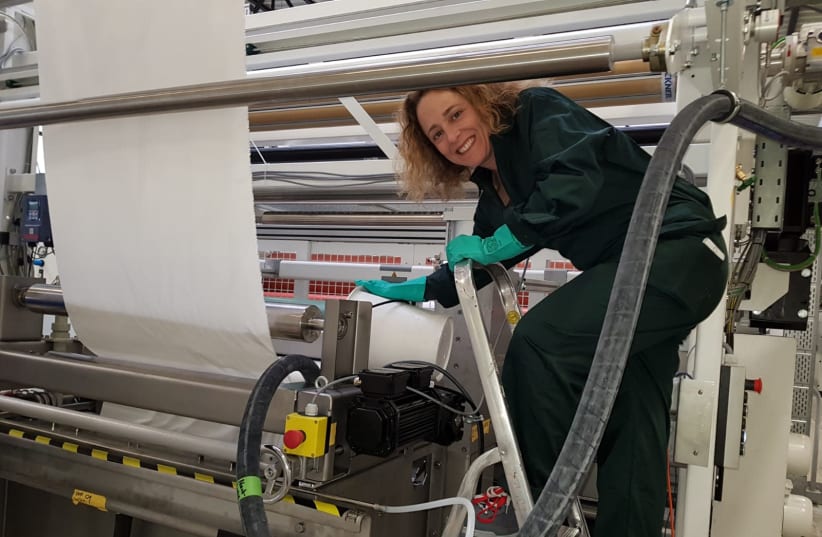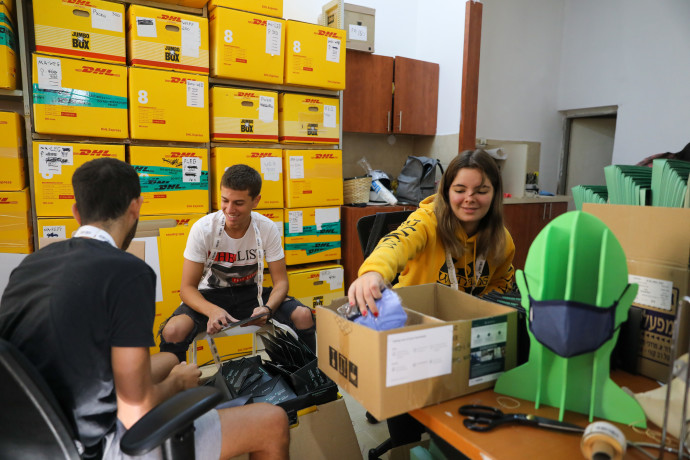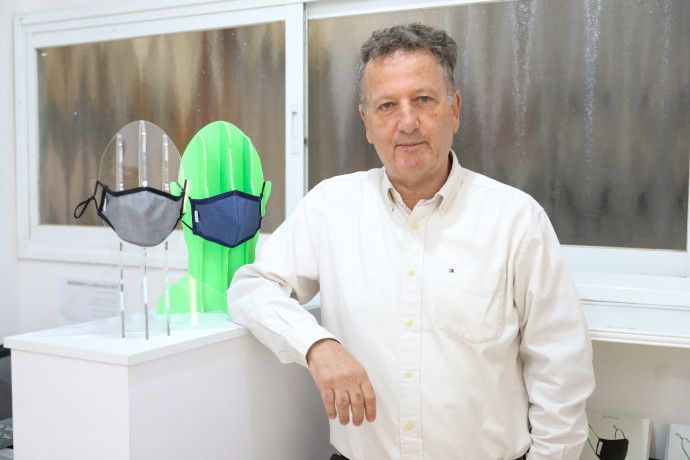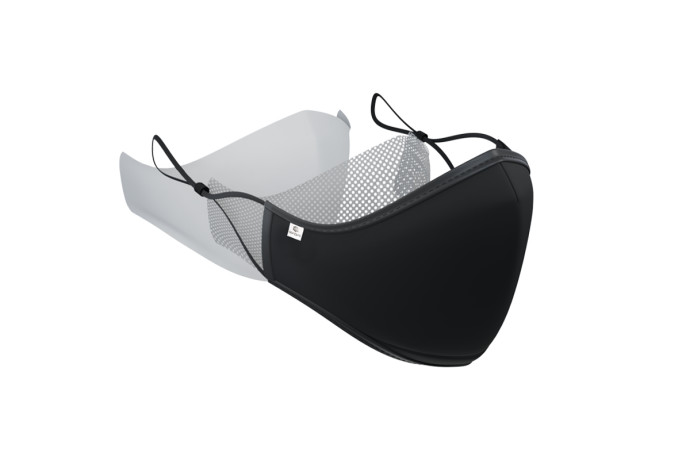While the pandemic ravaged the world economy, 2020 became a record-breaking year for Israeli technology. For Sonovia, a small textile start-up based in Ramat Gan, it was the deadly virus that brought the company to life.
“When we started, we were just six people,” recalled company co-owner Shay Hershcovich, as he stood at the entrance to the company’s modest headquarters. A tiny packing and distribution room on the bottom floor ships hundreds of thousands of the company’s signature SonoMask and SonoMask Pro face masks around the world. On the top floor, a modest lab perfects Sonovia’s proprietary technology.
“Today, we have around 60 staff members and close to 200 contractors.”
Visit the Sonovia website to learn more.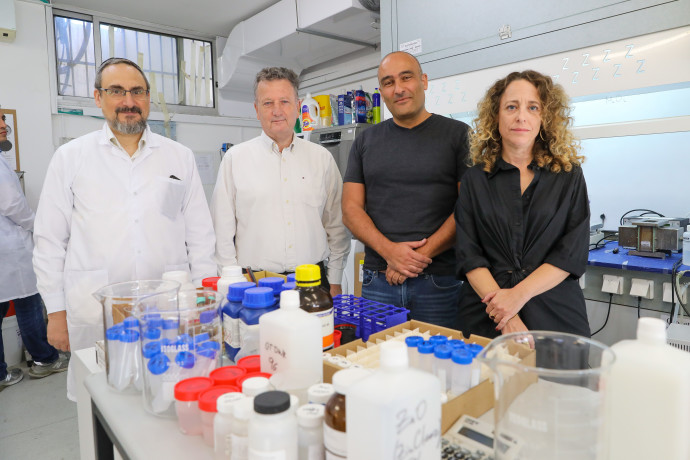
The company has sold more than a million protective masks to upwards of 300,000 clients in the last year.
Sonovia went public on the Tel Aviv Stock Exchange in December 2020, and its signature made-in-Israel mask is now expected to be just the first in a line of sustainable, antimicrobial textile products.
Learn more about Sonovia.
“I want to make the world better, help people to live better lives – and save a lot of lives,” Sonovia co-founder Shuki Hershcovich, Shay’s father, said. “That is my vision.”
SONOVIA WAS FOUNDED in 2013 by Shuki Hershcovich, who purchased from researchers at Bar-Ilan University the rights to its disruptive sono-based technology that embeds nanoparticles with desired properties onto textiles. The scientists had spent more than 10 years perfecting the technology, including four years funded by the European Union, specifically focused on fighting hospital-acquired infections. Sonovia then took the technology to the homestretch, making it commercial for manufacturers as an integral part of their existing production lines.
Israel went into this pandemic with by far the highest number of people dying from infectious disease per capita in the developed world – 73% more than the No. 2 country, Greece.
The company had been methodically developing its so-called “sono machines” with the aim of selling them at the industrial level. But when the coronavirus started emanating out of China, its team members wanted to help.
In December 2019, Shuki Hershcovich contacted his colleagues in China and told them he believed his antimicrobial fabric could help stop the spread of the novel virus. If so, he would ship some of the spools of anti-pathogen fabric he had produced in an R&D facility in Germany to China to help make masks or hospital apparel and protective clothing for frontline workers.
Buy a Sonovia mask.
“The first tests of the effectiveness of Sonovia’s fabric against the coronavirus were done in a Shanghai army lab,” CTO Liat Goldhammer-Steinberg recalled. “They were the only ones who had the virus for testing. Immediately, everyone was focused on using the virus for finding a vaccine and you could not use it in any commercial lab.”
The results from the Chinese lab proved the SonoMask effective, able to neutralize the novel coronavirus with 99.34% efficacy. So, in March 2020, the company imported the rest of its stored fabric from its R&D line to Ramat Gan, and from there drove it to a factory in Acre where 120,000 masks were crafted and donated to Israeli hospitals.
These masks would not only play a key role in boosting precious protection supplies when inventory everywhere was low, but would also completely innovate and redefine the definition of masks, transforming them from passive filtration barriers to active protection gear.
The company was determined to use its novel technology for the good of the State of Israel.
“We were on the last flight allowed into the country before the airport essentially shut down,” Goldhammer-Steinberg said. “While the rest of the country was in lockdown, we were on the road 24/7 signing on sub-contractors to sew the masks.”
Sonovia set up a team to handle the mask business, a separate division from its existing tech division, and hired staff to focus on online sales. It set up a website and an Israeli production plant. The fabrics are still being treated in Germany and imported to Israel from there, but all of the masks are made in the Holy Land and shipped out of a small packaging center in Ramat Gan.
“The fashion industry was hurting, the people who were used to sewing wedding dresses and underwear – we found them and gave them work,” Goldhammer-Steinberg said. Ultimately, they set up a factory in the mixed town of Acre, where they employ predominantly Arab women.
The remainder of Sonovia’s staff is also quite diverse and made up mostly of new immigrants. Employees come from Argentina, Brazil, Canada, France, Germany, Russia, Ukraine, the United States and everywhere in between.
MEANWHILE, the company continued to test its fabric in other labs, finding similar results against the H1N1 (swine flu), the British variant and, most recently, the Delta variant. It is now being tested against the Mu variant, too.
A study in an FDA-accredited American lab in March 2021 showed the masks could likewise eliminate acne-causing bacteria with over 99% efficacy.
“The test showed tremendous activity of the treated fabric against the bacteria Cutibacterium acne in anaerobic conditions,” said Prof. Amos Adler, director of the Clinical Microbiology Laboratory at Tel Aviv’s Sourasky Medical Center, who has served as a consultant for the company.
A report published last year in the Journal of Primary Care and Community Health showed that more than 50% of people who wore masks experienced a face mask-related adverse skin reaction, of which acne was the most prevalent. This condition has since been coined with the term “maskne” and has caused considerable anguish among mask wearers of all ages.
Adler has said that he expects the fabric to be likely to work against all COVID variants.
“COVID-19 variants might have different epidemiological or immunological properties that are the result of point mutations in critical areas of the receptor binding domain,” Adler said. “Still, their overall structure and biophysical properties of the virus are almost identical. Hence, the antiviral effect exerted by the Sonovia-treated fabrics is expected to be present in all COVID-19 variants.”
Sonovia’s technology uses sound waves to inject into the textile silver and zinc particles that kill bacteria and viruses.
“At the end of the day, we want to give our customers the security that they are wearing masks that work,” said Sonovia’s creative director Jordan Fox.
He said the company is also finding that people who are environmentally conscious are interested in the SonoMask because it can be washed more than 50 times without losing its effectiveness and keeps disposable masks out of the landfills and oceans.Visit the Sonovia website to get more details.
“Most disposable masks are made out of plastic. When they are thrown away, they end up in the sea and the fish eat them,” he said.
Moreover, they are a biological hazard. When hospital staff remove their masks, they throw them into hazard bins. But the average person just dumps the mask into the nearest trash bin or worse, potentially spreading the virus to someone who touches it or picks it up.
Sonovia publishes all of the independent lab results on its website. It also surveys customers regularly and modifies the masks to fulfill their needs. During a meeting with the company at its Ramat Gan headquarters, staff members wore different colors and shapes of the SonoMask, which have been developed over the last year to meet demand.
DESPITE THE SUCCESS of SonoMask, including a recent nearly 30% spike in stock value when a leading Italian textile-testing laboratory showed that its fabric eliminates the COVID-19 Delta variant particles with over 99.95% effectiveness, Sonovia does not plan to be known only as “the mask makers.”
The pandemic turned Sonovia cash-flow positive and that led to the interest of several of the most prominent Israeli investors, said head of operations Iuri Verba. The company raised NIS 50 million and is growing with plans to take its fabric to the apparel, automotive, locomotive, hospitality and medical industries.
Recently, the company started marketing reusable antimicrobial covers for in-flight seats. In June, it announced a new line of durable, self-sanitizing, anti-odor and cooling bed linens.
Above and beyond its anti-pathogen materials, Sonovia’s technology can be leveraged in other ways, too: UV protection, water-repellency, fire-retardancy and dyeing, as requested by its customers.
The company’s patented process is fully automated and can be easily integrated into existing production lines within a short period of time, Goldhammer-Steinberg said.
Earlier this year, Sonovia announced a partnership with a pilot agreement with Delta Galil Industries, which produces clothing for major brands ranging from Victoria’s Secret to Calvin Klein, to provide sustainable sportswear and other apparel that prevent odor. A machine should be in the Delta factory by the end of the year.
The income from sales like this could be around $231,000 per unit, in addition to about $1.5 million a year in income from the sale of the chemicals for each machine, explained CEO Igal Zeitun.
“The mask is just the tip of the iceberg,” he said.
Sonovia can also help textile companies that are trying to meet new environmental standards in the European Union.
According to Aaron Garzon, the company’s vice president for research and development, some 20% of wasted clean water emanates from the textile industry and Sonovia’s technology could help reduce the waste by as much as 50%, conserving precious drinking water.
“The idea is to sell our sono machines to the textile industry, which will use them to reduce the amount of water and chemicals they use,” said Aaron Garzon.
He said Sonovia’s chemical formulations are all water-based and that no chemical binders or other harmful materials are used.
The company is partnering with Bruckner to integrate its technology into the company’s own machines for the coating and finishing of apparel fabric, technical textiles, nonwovens, glass fabrics and floor coverings. Bruckener is an industry leader that has been in business since 1949.
But Shuki Hershcovich is careful to stress that the goal of Sonovia is not quick money but long-term success.
“We don’t manage the stock, we manage the company, which is focused on changing the world,” he said.
This article was written in cooperation with Sonovia. To learn more about the company and order a mask, click here.
